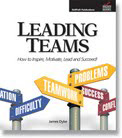The STAGES of anyone’s career can often be characterized as a journey of personal and professional development that is mirrored by these three roles. Successful advancement requires the strategic development of skills required at each level and for each role, as well as the commitment required to gain the skills and apply them.
DOERS who want to be promoted must gain the skills to MANAGE. They must learn how to supervise people and oversee projects. They must be able to lead a team of people and create the kind of team culture that supports high employee engagement, morale, and productivity. They must learn the business and couple their narrow expertise with the wisdom of a generalist, who can grasp the big picture of the organization and function collaboratively within. They must become as skilled with people as they are with processes and products.
As mentioned in previous installments of this series, the move from DOER to MANAGER is a challenging one. It is the more distinctive of the two shifts between roles—the biggest “leap” in professional advancement. Because…it requires ambitious employees to let go of their “doing” work/skills/successes in order to embrace a completely new set of tasks, skills, assignments and priorities. For many DOERS, the changes required for this shift are not worth the effort. In the end, many choose the satisfaction and simplicity of their task-oriented success and embrace the contentment of continuing to do the work they find most enjoyable.
MANAGERS who want to be promoted must sharpen and grow the LEADER skills they have acquired in their management role. I say that, because I have found that successful managing actually requires a certain level of leadership ability! The most effective managers are those who know this and have done the hard work of acquiring leadership skills for this very reason. The leadership skills that support effective management include a mix of “people” skills and personal strengths in areas like the following:
- Emotional Intelligence
- Critical thinking
- Decision-making and Problem-solving
- Team building
- Communicating
- Delegating
- Coaching / Constructive criticism
- Resolving conflict
- Motivating and Inspiring others
MANAGERS who aspire to higher-level management and executive LEADER jobs must hone these skills and be able to apply them to broader responsibilities, more sophisticated demands, and greater challenges! They must sharpen their political skills in order to initiate, collaborate, and persuade. They must access skilled critical thinking to solve bigger problems and make more substantive decisions. They must be able to motivate and inspire a broad and diverse leadership base across departments and divisions. As a result, they are forced to become constant learners—because of the demands of increasingly broader responsibility and oversight. Even more than MANAGERS, they must be able to get things done through other people, and to do so through inspiration, persuasion, and collaboration rather than positional power or coercion. As a result, the success of leaders is even more vulnerable to the work of others.
LEADERS must also learn to look farther down the road in order to craft and sell VISION and CHANGE. Leading change is a particularly difficult challenge. Because leaders must be acutely aware of when change is absolutely necessary and must succeed because of the need. Change for change’s sake is not just arbitrary, it is counter-productive for an organization—often damaging to employee morale and profitability. The Lindenberger Group puts it this way:
Change is essential for businesses to grow, expand, and thrive. However, change for change’s sake is foolhardy, disruptive, and likely inefficient.
Just as important, LEADERS must also know when to bring change to an END, to allow for a period of consolidation and internalization. They must be able to take into account the realities of human limitations and weary employees! In other words, LEADERS must be able to understand when the process of change needs to give way to the effective management of the new status quo.
Charlotte Beers commented on the difficult challenge of leading change:
“There’s no proof it will work or gain applause in the interim, and not everyone welcomes the disruption. But it’s also called growth, and the disruption doesn’t last forever.”
The goal is to see the day when appropriate “disruption” becomes accepted as a new and more productive reality.
So… where are you NOW in your career? And where do you want to be? If you accept the challenge of growth, and you have the ability to develop yourself and your skills, YOU CAN GET THERE!
Until next time… Yours for better leaders and better organizations,
Dr. Jim Dyke – “The Boss Doctor” ™ helping you to BE a better boss and to HAVE a better boss!





